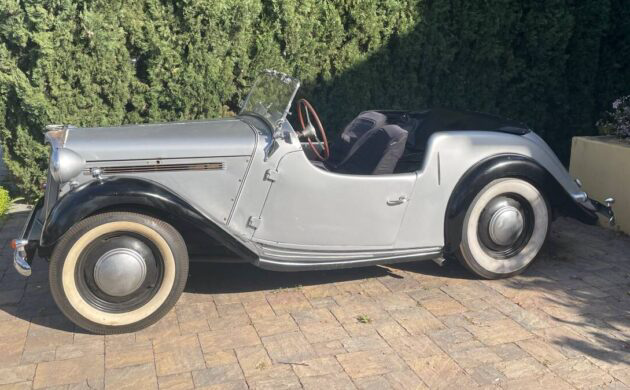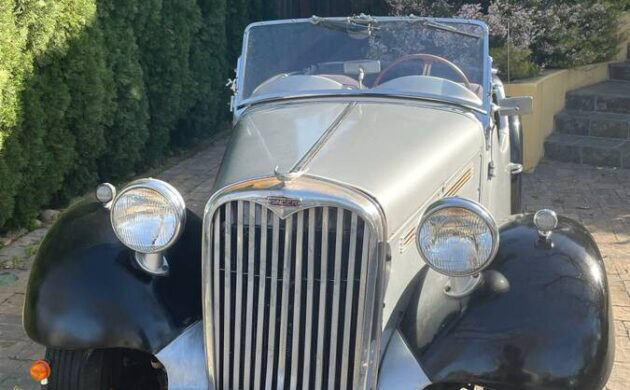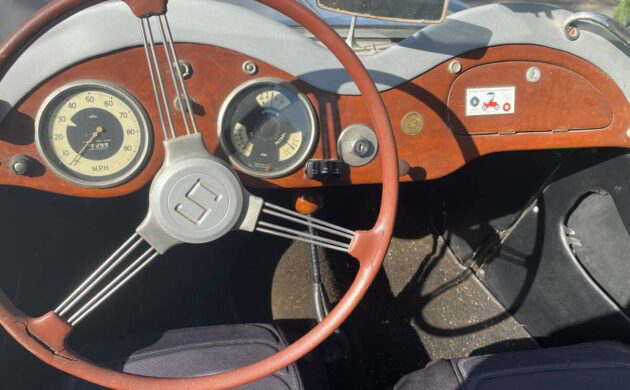During the 1930s, Singer ran an active race program, and it yearned to capitalize on the halo of its successes, not to mention cover the cost of frequent forays to tracks around the world. A sporty road car might augment the income accounts, and so in 1939, it introduced the Singer Nine Roadster, a four-seat touring car derived from the Bantam. However, the company’s marketing approach was necessarily circumspect, since three Singers had crashed on a single corner at the 1935 RAC Tourists Trophy, and in 1936, on the same circuit, a Riley driven by Jack Chambers lost control and killed eight spectators. The Nine’s advertisement consequently referred only obliquely to “inspiration from the LeMans model”. While “inspiration” may have been at work, it was not enough to ignite sales: the Nine had inherited the Bantam’s three-speed gearbox, limiting the performance of the 1074 cc motor. After WWII, the car was redesigned for improved handling and rear seat comfort – and given a four-speed ‘box. In 1953, the Nine was finally graced with Singer’s 1506 cc motor, with a slightly reduced stroke to equal 1497 cc’s, qualifying it to race in the 1500 cc class. This evolution – called the SM1500 – was rewarded, as several US celebrities were seen driving Singers, including Sammy Davis Jr and Marilyn Monroe. Here on craigslist is a 1953 Singer SM1500 4AD Roadster, with an asking price of $15,000 (firm). The car is located in Palo Alto, California. Barn Finder Matt R. submitted this tip – thanks, Matt!
The Singer was constructed of aluminum panels around an ash frame, with steel fenders. Relative to its earlier brethren, the 4AD had the largest engine bay, a shorter grille, and in the rear, signal lights mounted on stalks. Independent front suspension and hydraulic front brakes modernized the car substantially, though the rear brakes remained mechanical. The 1497 cc in-line four made about 48 hp when fitted with a single carburetor, but a rare version – the 4ADT – was fitted with two carbs and made 52 hp. No photo of the engine bay is provided, but the car is said to be in running condition.
Left-hand drive marks this as one of the few Singers made for export. Just over 2200 of these made it to our shores. While billed as a sporting car, the lack of a tachometer is slightly disappointing. This steering wheel needs repair, but the dash is in good condition. No word on the working condition of the gauges or electricals.
The seat covers appear to be wrinkled, the paint is oxidized, and while there’s a convertible top boot, we don’t know the condition of the top and its frame. The car should have side curtains. Our seller says his car is “in original condition” but I am questioning whether silver was ever an original color. All in all, I think some negotiation will be required before this potentially fun car can find its new garage.








Steel instead of wire wheels, a turn signal rocker switch nicer than my ‘61 Midget, 100 MPH speedometer, this appears to be more modern than some of the other cars of that era..
Nice!!
Not hard to beat the Midget turn signal switch. Toggle switch laid on it’s side in the middle of the dash doesn’t get very close to rocket science. Great cars though. The Singer could have use a little design refinement to smooth out the rough edges.
The Singer SM 1500 was my intro to ENGLISH SPORT CAR. I bought one in 1963. I was 15 years old. Had a crash course in Wentworth, Lucas, Dunlop, and paint and mechanics. Drove it in high school. Yes I have heard every joke that could ever be made about sewing. It would beat a MG T any day. From that time on to the present day that is what started it all. That was hundreds of cars ago. No joke. I still have it and will till the end of my time.
Never heard of the Singer, but it sure looks a lot like the MG of the day. I like it!!
Not a favourite. Post WW2 English manufacturers often just hashed over their pre-war car.
When Iwas 17, looking for my first sports car in 1970, the Singer was definitely not a contender.
Hollywood. Hollywood Singer! I say hey hey hey. What you got to say. Beautiful example of thirties deco design .
Saw one on the road in the early 70’s when I had my mgtd kinda liked it but not really.
Interesting. Like to see one with the top up.